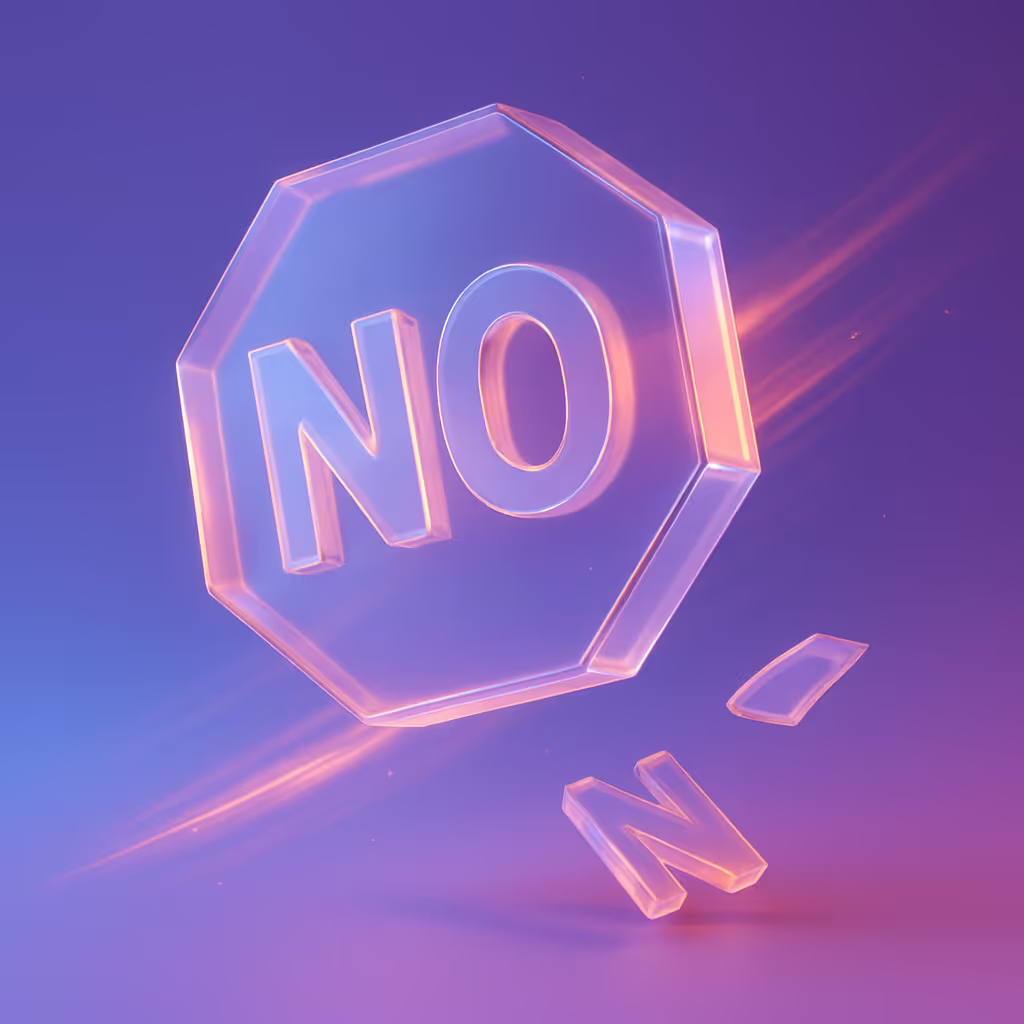Your ideal customer is Jim Carrey in "Yes Man". Now, if everyone was like him, we wouldn't need trained salespeople to handle objections and overcome the hurdles of the sales process.
But is "no" such a bad thing? Well… yes and no.
Find out for yourself!
Generic no's and how to avoid them
Lot's of entrepreneurs will tell you that the most important word you'll ever say and hear as a businessperson is "No". And they're right. Time is valuable, more so than money and you can't afford to commit to too many things at once.
But still you have to make a difference between a "generic" no and an actual fact-based objection.
When someone says "No" at the very beginning of a call or after a first non-detailed call or email, they can't possibly know enough to say that your product wouldn't be valuable for them.
Truth is, they're reluctant to giving you attention, time, and credibility because you haven't given them a compelling reason to be interested.
If you have properly done your research and truly believe that your prospect can really benefit from your product, those No's should not throw you off.
As Chris Beall puts it: 'The false “No” is the worst, because it tricks you into disqualifying the well-qualified, perhaps even the perfectly qualified.'
Expect those no's
If you call or write expecting a positive answer, you'll be disappointed to get a no. You may even start doubting yourself or act defensive. But once you acknowledge that "No" is the norm and actually constitutes the basis for most negotiations, you'll have a much more relaxed approach and, more importantly, will integrate "No" as part of your process.
People rarely ever say "Yes!" immediately after you propose a big change that'll require investment on their part. So get comfortable with rejection.
If your prospect feels that you're comfortable hearing/reading "No", they'll be much more receptive to what you might have to say next.
Deal with those no's
As I previously said, don't take these "No's" personally or against your product. It's a defensive move, your prospect is protecting their time and attention quota. Plus, they don't know you.
You need two weapons to deal with this: empathy and social proof. You need to show them that you understand why they would say no, but that you really believe you can help them because you've already helped other companies similar to theirs.
We at Overloop are used to overturn "No's"; respond with something along these lines, whether you're on the phone or typing on your computer:
I understand why you'd say no, you get tons of requests. And to be frank, I myself turn down my share of salespeople.
Our product has already helped [Company A], [Company B] and [Company C] get 50% more qualified prospects in just a few weeks. Which leads me to believe that you could benefit from it as well.
I however agree that neither of us can at this point know for sure if our solution can indeed be as valuable for you. How about we take a couple of minutes to clear that out?
By showing empathy, you demonstrate that you understand the position they're in and by displaying social proof, you showcase your ability to satisfy clients. Plus, by admitting that you don't know either if they're a good fit for the product, you're not being needy or pushy, which makes them much more likely to hear you out.
How to avoid generic no's?
As we already know, generic no's aren't real objections, and they occur before the discussion has chance to go anywhere. Whenever possible, make sure to generate a discussion and a connection before you mention your product. If your prospect is already engaged and sharing information about their company and the way they handle things, you can use that information to introduce your product later on in the discussion. You'll have a much better grasp of your prospect's needs by then.
And since you're already talking, they'll be much more open to hearing about what you have to offer.
Show genuine interest in what it is they're doing that you may help them with and they'll be open to hearing you out.
And at that point, if they object, you'll know it's for real, and you can start handling actual objections.
Objections
Sh*t's getting real, but you can definitely handle this!
Embrace the objection
Wait, I'll say it again, embrace the objection.
Negotiation expert Jim Camp encourages you to invite "No" into the conversation. It gives the opportunity for each party to explain what they expect out of the deal, or what the problem precisely is.
Plus, you want to acknowledge your prospect's objection as much as possible. You need to convey your understanding of their reluctance in order for them to feel that you're going to competently deal with it. And that you're not trying to shove your product down their throat.
Deal with it
Several obstacles may position themselves between you and closing your sale. Here's how to deal with them!
Understanding the benefits
Often times, misunderstanding will plague your sales process. As objections start to arise, start by making sure your prospect really understands the benefits your product will bring them.
Need
There isn't much you can do if your prospect has no need for your product. If the benefits are clear but they don't need them, then you should take your business somewhere else.
But don't do that before asking them whether it's okay to get in touch a few months later. Circumstances might have changed by then.
Price
Most of the time, price objections mean to… get you to get the price down.
Though, sometimes, discounts prove to be necessary to close a deal, most times, it is possible to thwart price objections.
As sales trainer Victor Antonio would say: sell on value!
Show your customer what your product can do to increase their revenue, expand market share, or reduce costs. If you can show them that your product will pay for itself or prove its value, you won't have to discount every time to get the deal.
Keep this in mind:
- Acknowledge that your prospect believes the price to be too high
- Ask questions:
Price objections can hide a lot of various concerns, it is now yours to dig them up and face them.
- Too high… compared to what? Have you found a similar solution for a cheaper price?
Find out whether it just means a lot of money to them in general, or if it means too much money compared to the value or if a competitor of yours is offering a similar solution at a better price.
That way, you know to steer the conversation back to value or simply identify that your prospect simply can't afford your product. You know to address the right issue by demonstrating how much more value you deliver compared to your competitors -so long as it is relevant to your prospect.
Pro tip: This is the opportunity to discover if your prospect has a hidden agenda, if they're already planning on going with one of your competitors. Ask the question outright if it fits the situation.
- How do you come to that conclusion?
As I said before, price objections are easy to bring up, but if you ask your prospect for their thought process on the subject, they might have a hard time articulating it if it's phoney. If they do come with a meaningful explanation, you then have something to talk about.
- How much does it cost you not to buy our product and keep doing what you're doing?
It may seem like a lot of money when you're discussing it, but maybe their current solution is costing them more than yours would be. If you can demonstrate that your product can bring the same or better performance for a cheaper price, you're on the right path!
NB: Remember, time represents a cost as well as money!
- Is it a matter of budget or cash flow?
The real question is : Is it too expensive or is it too expensive to pay at once? If it's a cash flow matter, you can now discuss payment plans.
- Do you feel you'll be paying for features you're not going to be using?
If you're in B2B and especially the SaaS industry, you may be selling a great product, with features your prospects are looking for, but also features they're not interested in. And since they would be paying for those as well, it may seem too expensive overall.
If you can make that out, you can offer to only give them access to the features they want, for a discounted price.
Fear of change
Fear of change can be motivated by different factors.
Most of the time, your prospect will be a) a manager in place for a long time, b) someone who's hasn't been there for as long but feeling the heat from above.
Either way, they have concerns:
- They fear they won't understand the product
- They might lose their job if the change isn't good
- Implementation costs a lot of time and energy
- They'd have to convince other employees
- The decision maker -in case it's not them- is doubtful about switching solutions
When your prospect is afraid of change, there are two things you should do:
- Demonstrate how much worse status quo is.
If you can demonstrate that staying where they are is more damageable than the cost of changing, you're winning.
To quote sales expert Brian Burn's exact words : 'A-Players know that it is their responsibility to guide the client throw the decision process and demonstrate that the cost of NOT acting is substantially more than placing the order NOW!'
2. Reassure with support
If they're going to change the way they work, they're entitled to full help and support from your part. Ensure they know you'll make yourself available whenever needed.
Authority
It happens often that your user is not the decision-maker. Which, more than an generic no -"I need to consult with my boss" or "My boss says no, thank you"- can constitute an actual objection.
In both cases, this brings you closer to the decision-maker. Agree that the boss should indeed take the decision, which is why you'd like to talk to them, the goal here being to set up a meeting with both parties as soon as possible.
Timing
"This is not a good time for us" is quite frequent to hear when it comes to objections.
Try to understand why it's not a good time. Since this is your area of expertise, you can -after acknowledging their objection- demonstrate why it actually is a good time. And how waiting won't benefit them, on the contrary.
If it actually is not a good time, acknowledge that as well. And politely ask whether it would be okay for you to contact them again at a later time.
Conclusion
You shouldn't take objections as the end of the game but as opportunities to prove the worth of your product.
Objections allow you to show how confident you are in your product's ability to solve your prospect's problems.
So relax, breathe and contact those leads you thought you lost, objections are just the beginning!



